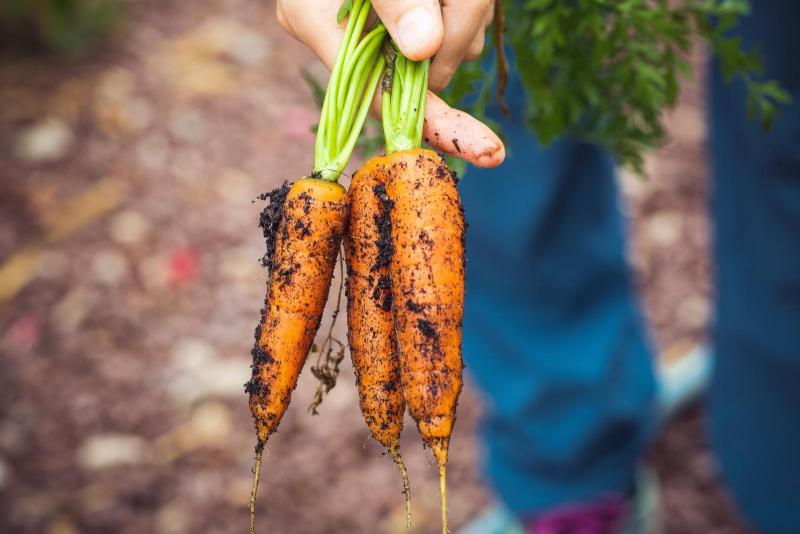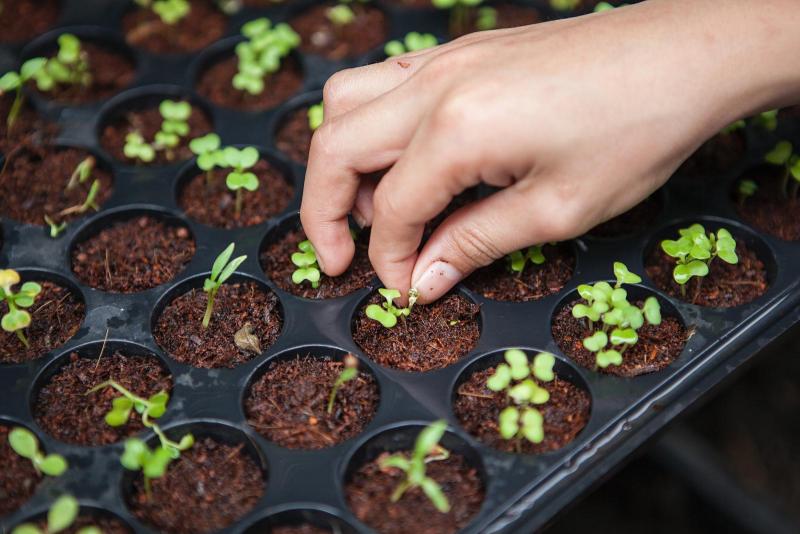Ideas and discoveries
A lack of hay for horses inspired Joes Jančář to create a smart nutrition for plants

Josef Jančář and his doctoral students from CEITEC (Central European Institute of Technology) BUT (Brno University of Technology) participated in the development of a unique range of preparations for plants. Together with his students, he founded the company ESCUBE in 2019, which is now celebrating success not only in the Czech Republic but also abroad with its natural-based products that increase the resistance of plants to various types of stress and improve the water cycle in the soil. An investor joined ESCUBElast year and the company is now preparing a project for one of the TA CR (Technology Agency of the Czech Republic) programmes together with the team of Josef Jančář.
An 85 per cent increase in green mass, a 75 per cent improvement in germination and root system strength, a 60 per cent increase in plant vigour during periods of climatic stress and a 50 per cent more efficient use of rainwater and reduction in irrigation. ESCUBE, the company behind the unique plant products, boasts these staggering figures on its website.
Josef Jančář, the head of the research group Advanced Polymeric Materials and Composites at CEITEC BUT and professor at the Institute of Materials Chemistry at FCH (Faculty of Chemistry) BUT, also contributed to their development. “I have been working with ESCUBE since the beginning, as I was one of the founders along with my doctoral students,” he says.
In the beginning, however, his work on products from this company was not related to his research at CEITEC BUT. “The scientific focus of our research group is in a completely different area. We focus on polymer nanocomposites, functional materials and materials for 3D printing,” says Josef Jančář. But the situation has changed in the past year, he said. Last year, an investor joined the young company, thanks to which it can now afford to commission research at institutions such as CEITEC BUT. “We are currently preparing a joint project for one of the TAČR programmes,” Jančář adds.
Dry summer and first product ideas
The original idea for a special plant food dates back to 2018. “It was one of the driest years in the last 20 years. As horse breeders we were faced with a severe shortage of hay and the practical unusability of pasture. Me, a polymer chemist, thought at the time that we could somehow try to improve the water cycle in the soil so that more of it was used by plants and less evaporated,” says Josef Jančář. At first, he considered the use of superabsorbent polymers used in toiletries. For example, in disposable diapers. “However, a look at the literature and consultations with farmers led me to the conclusion that this is not the way to go. Moreover, my wife, an environmental law lecturer, warned me that from 2025 the use of synthetic polymers in soil will be significantly restricted or even banned,” says Jančář.

Therefore, he had no choice but to come up with another solution. “Environmentally friendly and still providing the desired effect. So I went to one of the hobby markets to see what was available. The available soil conditioners were expensive and contained synthetic superabsorbent polymers, so I started “cooking” something new at the cottage,” he recalls.
The family invested in the first experiments and Josef Jančář developed two types of products – liquid and solid. “On the advice of my son-in-law, who is in the investment business, we decided that we needed to add other features to just water retention. In order to differentiate ourselves from other products on the market,” says Jančář.
A solution that improves plant viability and retains water in the soil
This has resulted in products that combine soil wetting agents, wetting agents and hydroabsorbent microgel carriers for biostimulants. Besides that, the products also contain extracts from peat moss, seaweed or California earthworm compost, for example. The contained microgels then gradually release humines, enzymes and phytohormones into the soil based on external and internal stimulus. Microgels are able to penetrate down to the hair roots of plants due to their small size. “Biostimulants add natural stimulants to plants to help them process nutrients more efficiently and possibly stimulate some of their vital functions. For example, increasing the root system and increasing the formation of hair cells necessary to overcome abiotic stress, such as drought,” Jančář explains.
The contained hydroabsorbents, wetting agents and emollients improve soil moisture management. They can retain rainwater, limit evaporation and reduce surface runoff. “The principle of operation of soil emollients is the same as that of cosmetic moisturizers (e.g. hyaluronic acid, urea), which do a similar service by physically binding water that would evaporate through the skin, with all the consequent effects on skin suppleness. The second function is to retain water in the soil, which is what the original starch microgels are used for. These are particles that can absorb water into their structure with a mass five hundred times higher than that of a dry microgel. Realistically, however, it is more like 100 to 200 times. If the surrounding soil dries out, water is released back into the soil. In contrast to synthetic superabsorbent polymers, which release only about 50 percent of the retained water, they release all the retained water, since in addition to the diffusion of free water into the soil, the physically bound water is also released as a result of their total biodegradation. Moreover, the products also contain substances that improve water infiltration into the soil,” explains Josef Jančář, adding that the consumption of irrigation water is reduced by up to half. “When the first drops of rain fall on dry soil, balls form. Soil is generally hydrophobic due to the presence of organic residues, i.e. it repels water. Just like an oiled frying pan. So if we add a substance that is “friend” with both polar water and non-polar soil, the water will start to wet the soil and penetrate it well. This reduces, for example, water erosion during torrential rainfall and also speeds up the entry of water into the soil during irrigation. Less of it evaporates from the surface before infiltration,” he adds.
Currently ESCUBE offers products for fruit and vegetables, shrubs and trees as well as houseplants. These plant biostimulants can also be used in organic farming and in the production of organic food. According to Josef Jančář, the company is already cooperating with the Institute of Plant Nutrition at the Faculty of Agronomy at Mendel University on other products. “In contrast to the Faculty of Agronomy at MENDELU, our planned cooperation will concern the technical use of superabsorbent polymers in the construction industry, not in the field of agricultural applications,” he concludes.
(zeh)
Women from BUT who move the world of science and technology
Bold innovation in recycling: researcher Silvestr Figalla turns waste sludge into a valuable raw material
Cheaper, better quality and eco-friendly. FCH BUT researchers create new dextrin adhesive
„Plastics will always be here, we just need to treat them differently," says the chemist Adriána Kovalčík, who has learned to face challenges
From Prosecco to Bioplastics: An Italian Scientist's Journey to Sustainable Innovations